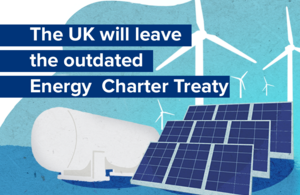UK departs Energy Charter Treaty
The UK government confirms its withdrawal from the Energy Charter Treaty after efforts to agree vital modernisation fail.

- European countries have been unable to reach agreement on modernisation of the Energy Charter Treaty
- UK joins France, Spain and the Netherlands in withdrawing from the Treaty
- strong legal framework is already in place to ensure continued investment in UK energy sector
The UK will leave the Energy Charter Treaty (ECT) after the failure of efforts to align it with net zero, the government has announced today (Thursday 22 February).
Signed in 1994, the Energy Charter Treaty was designed to promote international investment in the energy sector, historically providing protections for investors in fossil fuels. Proposals to modernise the ECT better to support cleaner technologies have been subject to months of talks between European countries, resulting in a stalemate.
Energy Security and Net Zero Minister Graham Stuart announced in September 2023 that the UK would be reviewing its membership of the ECT if plans to update it were not adopted.
Today, the UK joins 9 EU member states, including France, Spain and the Netherlands, in withdrawing from the treaty. The decision will support the UK’s transition to net zero and strengthen its energy security.
Minister of State for Energy Security and Net Zero, Graham Stuart, said:
The Energy Charter Treaty is outdated and in urgent need of reform but talks have stalled and sensible renewal looks increasingly unlikely.
Remaining a member would not support our transition to cleaner, cheaper energy, and could even penalise us for our world-leading efforts to deliver net zero.
With £30 billion invested in the energy sector just since September, we continue to lead the world in cutting emissions, attracting international investment and providing the strongest legal protections for those who invest here.
Discussions around reform of the Energy Charter Treaty have gone on for several years. After 2 years of negotiations, in 2022, the UK helped broker a landmark agreement to modernise the ECT. This would have maintained its current benefits, while supporting the transition to cleaner energy by extending protections to renewables like carbon capture, utilisation, and storage (CCUS) and hydrogen.
However, this led to an impasse and the modernised ECT, which should have been adopted in November 2022, was rejected by 9 EU member states. This included France, Germany, Spain and the Netherlands – all of whom decided to withdraw. The European Parliament elections in 2024 mean modernisation could now be delayed indefinitely.
After considering the views of businesses, industry and civil society, ministers will now instigate the UK’s withdrawal, which will take effect after one year, removing protections for new investments after this period.
Shaun Spiers, executive director, Green Alliance said:
Civil society organisations and parliamentarians from all political parties have been clear that the Energy Charter Treaty is an out-of-date agreement and undermines our efforts to tackle climate change. We welcome the UK’s decision to leave, which will strengthen global efforts to roll out cheap, clean renewable energy.
Meanwhile, the UK remains an attractive destination for investors across all energy technologies, with government continuing to support investment in the North Sea oil and gas as part of the transition to net zero, alongside the drive towards renewables, such as wind power and hydrogen. The government is also committed to ensuring fairness for and support for UK investors operating abroad.